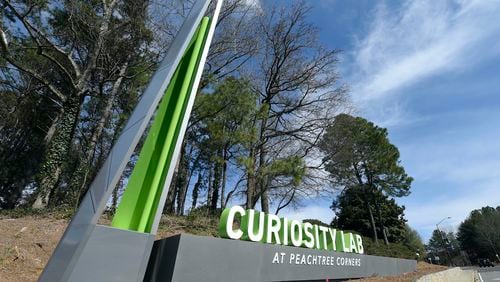A 5G network gives people a faster Internet connection, but it’s useful beyond streaming a buffer-free video on a cell phone.
The Curiosity Lab at Peachtree Corners, Georgia Institute of Technology and T-Mobile are launching a startup incubator, giving companies access to a high-speed 5G network for developing emerging technologies reliant on fast data connections.
The 5G Connected Future incubator will help entrepreneurs and startups bring autonomous vehicles, robots, drones and other products to consumers, said Betsy Plattenburg, executive director of The Curiosity Lab, a publicly funded innovation lab in Peachtree Corners.
With its Accelerator program, T-Mobile first powered the Gwinnett City with 5G in 2019, giving companies a place to test their technology at The Curiosity Lab. But the new incubator will offer far more resources, letting them also build and market their creations while receiving expert advice.
“A lot of times the success of a startup is due to serendipity, and we feel like we’re helping to engineer that serendipity by bringing these partners together,” Plattenburg said.
Georgia Tech’s Advanced Technology Development Center will hire a dedicated staff member for the incubator, who will recruit, evaluate coach and mentor startups across technology sectors, said John Avery, director of the center. The ATDC brings 40 years of experience to the partnership, offering similar programs in the advanced manufacturing and financial, retail and health spaces, Avery said.
The Curiosity Lab will provide its 25,000-square-foot innovation center, three-mile autonomous test track and other facilities to the startups, while T-Mobile will provide expert advice for its 5G network.
The incubator will allow young startups to take advantage of the resources provided by each partner, rather than relying on an introduction to someone who can “make or break your success” in getting a product on the market, Plattenburg said.
Beyond faster load times for phone users, 5G networks could speed up processes in a variety of technologies, such as autonomous vehicles braking instantaneously when approaching an object in the same time it’d take for the driver to brake themselves, said Bryan Fries, vice president of advanced and emerging tech for T-Mobile.
“When we start to experience 5G as a community, the things we’re going to experience are far different than what we’re used to on (mobile devices)” Fries said. “This is about creating connections and experiences that couldn’t exist before.”
With the rise of 5G networks, it unlocks endless possibilities for companies to revamp and create both existing and new technologies, Avery said. “It’s named the Connected Future because we don’t know all the things that will be connected in the future,” Plattenburg said.
The incubator is still in its infancy, but startups can go ahead and apply for the program.
About the Author







